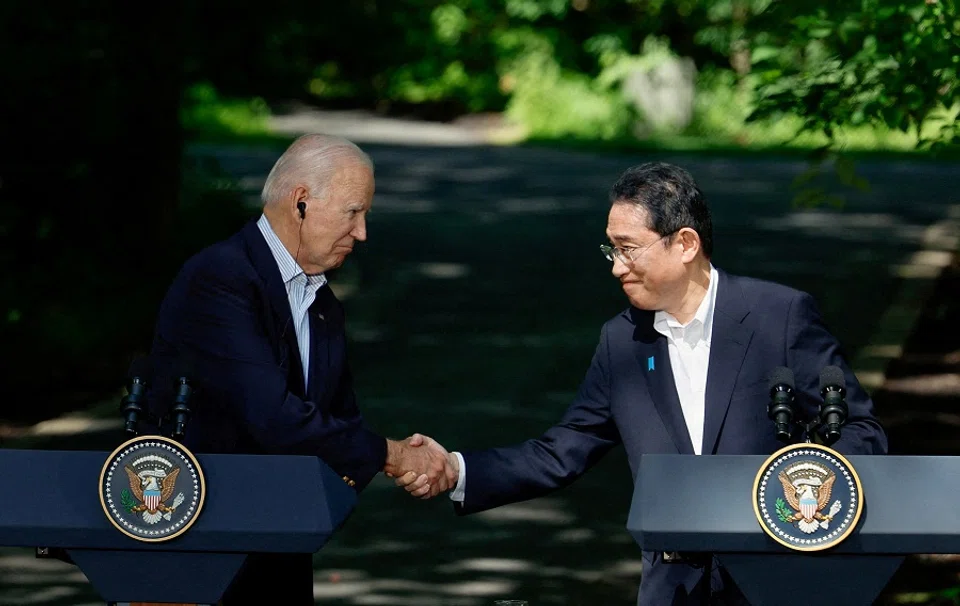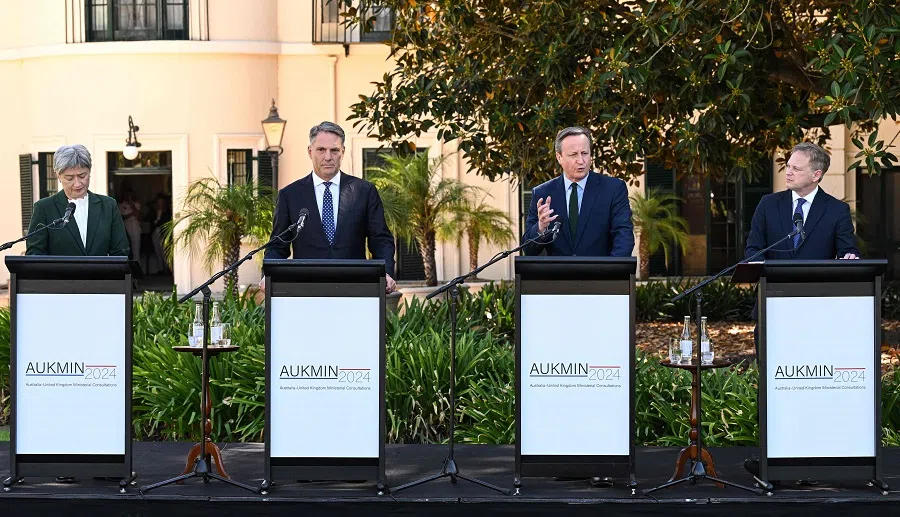Japanese academic: Why Japan should join AUKUS
Japan’s potential inclusion in AUKUS could bolster defence capabilities for all members, but China views it as a NATO-like expansion. Japanese academic Masafumi Iida discusses the issue.

There is growing speculation that Japan will join AUKUS, a security cooperation framework between Australia, the UK, and the US.
AUKUS was established by the US, UK, and Australia in September 2021, and its cooperation consists of two pillars.
Pillar I encompasses US and UK cooperation to support Australia in acquiring a nuclear-powered attack submarine. This joint effort aims to develop a new type of nuclear-powered submarine, the “SSN-AUKUS”, which does not carry nuclear armaments. The submarine is intended for deployment by the Australian and British militaries.
Additionally, starting in 2027, US and British nuclear submarines will rotate deployment at the HMAS Stirling naval base in Australia. Furthermore, Australia plans to procure three US Virginia-class nuclear submarines by the early 2030s, with the US providing training for Australian military crews.
It can be said that the Japanese government is positively considering participating in AUKUS Pillar II cooperation, also because it would help in strengthening Japan’s security.
Japan’s participation and cooperation in Pillar II
Pillar II is a cooperative effort to develop advanced technologies that will enable dramatic improvements in defence capabilities.
The US, UK, and Australia will cooperate in the development of advanced technologies related to hypersonics, electronic warfare, artificial intelligence (AI), quantum communications and computers, and the development of equipment that applies these technologies.
Under the second pillar, the US, UK, and Australia have indicated their intention to promote cooperation with like-minded countries. The joint statement of the AUKUS Defense Ministers’ Meeting held in April 2024 noted Japan’s technological strengths and close bilateral defence partnerships with the three countries, and mentioned that “we are considering cooperation with Japan on AUKUS Pillar II advanced capability projects”.
The AUKUS countries have in fact called on Japan to cooperate in Pillar II. To date, the Japanese government has not indicated a clear policy regarding participation in AUKUS Pillar II.

However, in the Joint Statement issued at the US-Japan-Australia Trilateral Defense Ministers’ Meeting (TDMM) 2024 held in May 2024, the Ministers “noted the positive contribution the AUKUS partnership has on the security and stability in the region” and stated that the Ministers “acknowledged that AUKUS partners are considering cooperation with Japan on AUKUS Pillar II advanced capability projects”.
It can be said that the Japanese government is positively considering participating in AUKUS Pillar II cooperation, also because it would help in strengthening Japan’s security.
... for democratic countries such as the US, UK, Australia, and Japan, the forced mobilisation of resources by the state is not an option, so the most effective response in the competition with China is to develop and share technology through cooperation among countries.
China’s discomfort
The great power competition centred on the US and China over the future international order is intensifying. The development of “game-changing technologies” that dramatically enhance military power has become one of the major battlegrounds in the great power competition.
China is mobilising military and civilian resources on a large scale to develop cutting-edge technology, aiming to tilt the military balance with the US in China’s favour by outpacing the US in scientific and technological development. In contrast, for democratic countries such as the US, UK, Australia, and Japan, the forced mobilisation of resources by the state is not an option, so the most effective response in the competition with China is to develop and share technology through cooperation among countries.
For Japan, which is highly unlikely to win the technological development race with China on its own, promoting cooperation in the development of advanced technology with AUKUS countries is extremely meaningful in strengthening its defence capabilities.
By actively participating in AUKUS, Japan will strengthen the UK’s involvement in the security of the Indo-Pacific region, which will lead to further layering of the multilateral cooperation framework promoting FOIP.

Japan’s involvement in AUKUS is also important for the realisation of the “Free and Open Indo-Pacific (FOIP)” that Japan is promoting. The US, UK and Australia are committed to FOIP and are like-minded countries that share Japan’s interests in maintaining a rules-based international order.
Multilateral cooperation frameworks aimed at realising FOIP include Japan-US-Australia, Japan-US-Korea, Japan-US-Australia-India (Quad), and Japan-US-Australia-Philippines, but AUKUS is different in that the UK is a member. By actively participating in AUKUS, Japan will strengthen the UK’s involvement in the security of the Indo-Pacific region, which will lead to further layering of the multilateral cooperation framework promoting FOIP.
South Korea, Canada, Germany, Italy, and others may join the cooperation.
China has criticised the expansion of AUKUS as a move to build an “Asian NATO”. However, AUKUS is quite different from a military alliance that provides for mutual defence. In addition, there is no possibility that Japan or other countries will be involved in cooperation on the development and deployment of nuclear submarines, which is Pillar I.
Opportunities for other countries to be involved in AUKUS are limited to Pillar II. Therefore, even if the number of countries involved in AUKUS increases, it will not function as a military alliance like NATO.
Not only Japan, but other countries that share the FOIP will also increase their involvement in cooperation in the development of advanced technology. South Korea, Canada, Germany, Italy, and others may join the cooperation. In the future, AUKUS will gradually increase the number of participating countries as “AUKUS Plus”.





